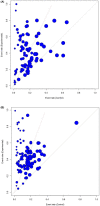The effects of psychotherapies for depression on response, remission, reliable change, and deterioration: A meta-analysis
- PMID: 34107050
- PMCID: PMC8457213
- DOI: 10.1111/acps.13335
The effects of psychotherapies for depression on response, remission, reliable change, and deterioration: A meta-analysis
Abstract
Objective: Meta-analyses of psychotherapies usually report effects sizes, while clinicians and patients need to know the proportion of patients who benefit from therapy. We conducted a meta-analysis of therapies for depression reporting the rates of response (50% symptom reduction), remission (HAM-D <7), clinical significant deterioration for psychotherapy, and control conditions (CAU, waitlist, and pill placebo), as well as the relative risk of these outcomes and the numbers-needed-to-be-treated (NNTs).
Methods: We searched bibliographic databases and included 228 randomized trials comparing psychotherapy for depression against control conditions (75 with low risk of bias). Only therapies with at least 10 trials were included. We extracted outcomes from the studies, and for those studies not reporting the outcomes, we used a validated method to estimate the rates.
Results: The overall response rate in psychotherapies at 2 (±1) months after baseline was 41% (95% CI: 38~43), 17% (15~20) for usual care (CAU), and 16% (95% CI: 14~18) for waitlist. No significant differences between types of therapy were found. The NNT for therapy versus CAU was 5.3 and versus waitlist 3.9. About one third of patients remitted after therapy compared with 7%-13% in control conditions. The rates of deterioration were 5% versus 12%-13%, respectively. Most sensitivity analyses supported the general findings.
Conclusion: Psychotherapies for depression may be effective compared with control conditions, but more than half of patients receiving therapy do not respond and only one third remitted. More effective treatments and treatment strategies such as sequencing and combining treatments are clearly needed.
Keywords: cognitive behavior therapy; depression; major depressive disorder; meta-analysis; psychotherapy.
© 2021 The Authors. Acta Psychiatrica Scandinavica published by John Wiley & Sons Ltd.
Conflict of interest statement
HN reported personal fees from Boehringer Ingelheim, Kyowa Kirin, ASKA Pharmaceutical, and Toyota Motor Corporation outside the submitted work. TAF reports grants and personal fees from Mitsubishi‐Tanabe, personal fees from MSD, personal fees from Shionogi, outside the submitted work. In addition, TAF has a patent 2018‐177688 concerning smartphone CBT apps pending, and intellectual properties for Kokoro‐app licensed to Mitsubishi‐Tanabe. All the other authors declare no competing interests.
Figures
References
-
- Karyotaki E, Smit Y, de Beurs DP , et al. The long‐term efficacy of acute‐phase psychotherapy for depression: a meta‐analysis of randomized trials. Depress Anxiety. 2016;33:370‐383. - PubMed
-
- Cuijpers P, Karyotaki E, de Wit L , Ebert DD. The effects of fifteen evidence‐supported therapies for adult depression: a meta‐analytic review. Psychother Res. 2020;30:279‐293. - PubMed
-
- Cuijpers P, Karyotaki E, Reijnders M, Huibers MJH. Who benefits from psychotherapies for adult depression? A meta‐analytic update of the evidence. Cogn Behav Ther. 2018;47:91‐106. - PubMed
Publication types
MeSH terms
LinkOut - more resources
Full Text Sources
Other Literature Sources
Medical



